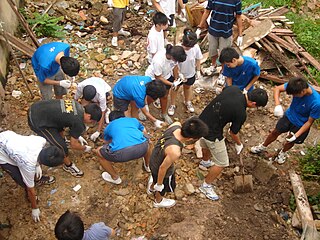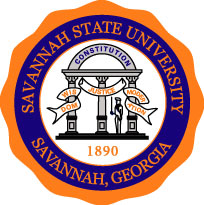Related Research Articles

Interdisciplinarity or interdisciplinary studies involves the combination of multiple academic disciplines into one activity. It draws knowledge from several other fields like sociology, anthropology, psychology, economics, etc. It is about creating something by thinking across boundaries. It is related to an interdiscipline or an interdisciplinary field, which is an organizational unit that crosses traditional boundaries between academic disciplines or schools of thought, as new needs and professions emerge. Large engineering teams are usually interdisciplinary, as a power station or mobile phone or other project requires the melding of several specialties. However, the term "interdisciplinary" is sometimes confined to academic settings.

The University of Vermont (UVM), officially titled as University of Vermont and State Agricultural College, is a public land-grant research university in Burlington, Vermont. Founded in 1791, the university is the oldest in Vermont and the fifth-oldest in New England, making it among the oldest in the United States. It is one of the original eight Public Ivies.

Santa Clara University is a private Jesuit university in Santa Clara, California. Established in 1851, Santa Clara University is the oldest operating institution of higher learning in California. The university's campus surrounds the historic Mission Santa Clara de Asís which traces its founding to 1777. The campus mirrors the Mission's architectural style and is one of the finest groupings of Mission Revival architecture and other Spanish Colonial Revival styles. The university is classified as a "Doctoral/Professional" university.

Service-learning is an educational approach that combines learning objectives with community service in order to provide a pragmatic, progressive learning experience while meeting societal needs.

The Asian Institute of Technology (AIT), founded in 1959, is an international organization for higher education situated 40km north of Bangkok, Thailand. It specializes in engineering, advanced technologies, sustainable development, and management and planning. It aims to promote technological change and sustainable development in the Asia-Pacific region, through higher education, research, and outreach.

The University of Alabama in Huntsville (UAH) is a public research university in Huntsville, Alabama. The university is accredited by the Southern Association of Colleges and Schools and comprises eight colleges: arts, humanities & social sciences; business; education; engineering; honors; nursing; science; and graduate. The university's enrollment is approximately 10,000. It is part of the University of Alabama System and is classified among "R1: Doctoral Universities: Very High Research Activity".

Southern Illinois University Edwardsville is a public university in Edwardsville, Illinois in Metro-East, near St. Louis. SIUE was established in 1957 as an extension of Southern Illinois University Carbondale. It is the younger of the two major institutions of Southern Illinois University system, and, as of 2018, has the larger enrollment. The university offers graduate programs through its Graduate School.

Environmental education (EE) refers to organized efforts to teach how natural environments function, and particularly, how human beings can manage behavior and ecosystems to live sustainably. It is a multi-disciplinary field integrating disciplines such as biology, chemistry, physics, ecology, earth science, atmospheric science, mathematics, and geography.

The American Society for Engineering Education (ASEE) is a non-profit member association, founded in 1893, dedicated to promoting and improving engineering and engineering technology education. The purpose of ASEE is the advancement of education in all of its functions which pertain to engineering and allied branches of science and technology, including the processes of teaching and learning, counseling, research, extension services and public relations. ASEE administers the engineering technology honor society Tau Alpha Pi.

Science, technology, engineering, and mathematics (STEM) is an umbrella term used to group together the distinct but related technical disciplines of science, technology, engineering, and mathematics. The term is typically used in the context of education policy or curriculum choices in schools. It has implications for workforce development, national security concerns, and immigration policy, with regard to admitting foreign students and tech workers.

Savannah State University is a public historically black university in Savannah, Georgia. It is the oldest historically black public university in the state. The university is a member-school of the Thurgood Marshall College Fund.
The University of California, Irvine has over fourteen academic divisions.

The School of Social Ecology (SSE) is a school at the University of California, Irvine (UCI) that focuses on social ecology. Students in SSE at UCI undergo a multidisciplinary program that examines real-world social and environmental issues and that involves the students in off-campus internship involves the students in off-campus internships and SSE offers undergraduate and graduate degrees, including bachelor's, professional master's, and Ph.D.s.
Humanitarian engineering is the application of engineering for humanitarian aid purposes. As a meta-discipline of engineering, humanitarian engineering combines multiple engineering disciplines in order to address many of the world's crises and humanitarian emergencies, especially to improve the well-being of marginalized populations.

Indian Institute of Science Education and Research, Bhopal is an autonomous research institute in Bhauri, Bhopal district, Madhya Pradesh, India. It was established by the Ministry of Education (India), Government of India in 2008 in order to incorporate research in fundamental science at undergraduate and graduate level, with equal emphasis on higher education for research and education in science. It is an autonomous institution awarding its own degrees.
A sustainability organization is (1) an organized group of people that aims to advance sustainability and/or (2) those actions of organizing something sustainably. Unlike many business organizations, sustainability organizations are not limited to implementing sustainability strategies which provide them with economic and cultural benefits attained through environmental responsibility. For sustainability organizations, sustainability can also be an end in itself without further justifications.
The Penn State College of Engineering is the engineering school of the Pennsylvania State University, headquartered at the University Park campus in University Park, Pennsylvania. It was established in 1896, under the leadership of George W. Atherton. Today, with 13 academic departments and degree programs, over 11,000 enrolled undergraduate and graduate students, and research expenditures of $124 million for the 2016-2017 academic year, the Penn State College of Engineering is in the top 20 of engineering schools in the United States. It is estimated that at least one out of every fifty engineers in the United States got their bachelor's degree from Penn State. Dr. Justin Schwartz currently holds the position of Harold and Inge Marcus Dean of Engineering.
Human services is an interdisciplinary field of study with the objective of meeting human needs through an applied knowledge base, focusing on prevention as well as remediation of problems, and maintaining a commitment to improving the overall quality of life of service populations. The process involves the study of social technologies, service technologies, and scientific innovations designed to ameliorate problems and enhance the quality of life of individuals, families and communities to improve the delivery of service with better coordination, accessibility and accountability. The mission of human services is to promote a practice that involves simultaneously working at all levels of society in the process of promoting the autonomy of individuals or groups, making informal or formal human services systems more efficient and effective, and advocating for positive social change within society.
Esi Awuah is a Ghanaian academic and former vice chancellor of the University of Energy and Natural Resources in Sunyani, Ghana.
Global citizenship education (GCED) is a form of civic learning that involves students' active participation in projects that address global issues of a social, political, economic, or environmental nature. The two main elements of GCE are 'global consciousness'; the moral or ethical aspect of global issues, and 'global competencies', or skills meant to enable learners to participate in changing and developing the world. The promotion of GCE was a response by governments and NGOs to the emergence of supranational institution, regional economic blocs, and the development of information and communications technologies. These have all resulted in the emergence of a more globally oriented and collaborative approach to education. GCE addresses themes such as peace and human rights, intercultural understanding, citizenship education, respect for diversity and tolerance, and inclusiveness.
References
- ↑ Van de Ven, Andrew H. Engaged Scholarship: A Guide for Organizational and Social Research: A Guide for Organizational and Social Research. Oxford University Press, 2007.
- ↑ Small, Stephen A., and Lynet Uttal. "Action‐oriented research: Strategies for engaged scholarship." Journal of Marriage and Family 67.4 (2005): 936-948.
- ↑ Barge, J. Kevin; Shockley-Zalabak, Pamela (2008-08-01). "Engaged Scholarship and the Creation of Useful Organizational Knowledge". Journal of Applied Communication Research. 36 (3): 251–265. doi:10.1080/00909880802172277. ISSN 0090-9882. S2CID 145648440.
- ↑ McCarthy, Ian P.; Bogers, Marcel L. A. M. (2022-05-12). "The open academic: Why and how business academics should use social media to be more 'open' and impactful" (PDF). Business Horizons. 66: 153–166. doi: 10.1016/j.bushor.2022.05.001 . ISSN 0007-6813. S2CID 248760146.
- ↑ "Outreach Awards". Penn State Outreach. Archived from the original on 2021-04-11. Retrieved 2021-10-11.
- ↑ "Offices and Services | Johns Hopkins Bloomberg School of Public Health". Archived from the original on 2014-11-29. Retrieved 2014-11-16.
- ↑ "The Scholarship of Engagement: Center for Engaged Learning, Teaching, and Scholarship (CELTS): Loyola University Chicago". Archived from the original on 2014-11-29. Retrieved 2014-11-16.
- ↑ "American Cultures Engaged Scholarship (ACES) | Equity, Inclusion, and Diversity". Archived from the original on 2014-11-29. Retrieved 2014-11-16.
- ↑ "Engineering Scholars | Berkeley Engineering". Archived from the original on 2014-11-29. Retrieved 2014-11-16.